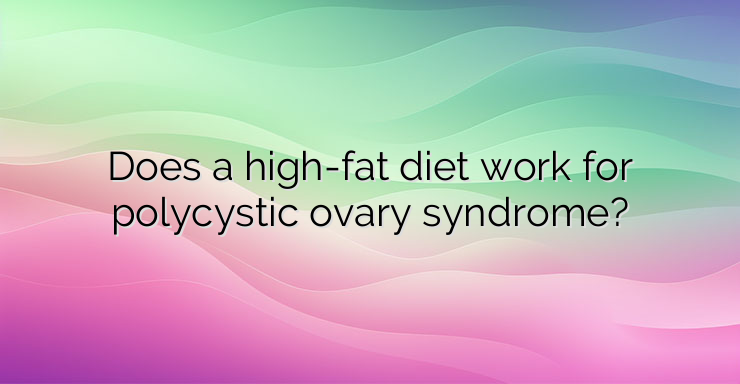Polycystic ovary syndrome is a condition that significantly affects ovarian function. It is characterized by a combination of high levels of male sex hormones, disturbances in ovulatory cycles and polycystic ovaries. The condition affects 4 out of 10 women and leads to reproductive disorders. In addition, polycystic ovary syndrome is associated with numerous metabolic diseases, such as impaired glucose tolerance, type 2 diabetes, hyperinsulinemia, insulin resistance, hypertension, and fatty liver. Recent studies have shown that excessive consumption of carbohydrates in polycystic ovary syndrome leads to insulin resistance and high levels of male sex hormones – hyperandrogenism. Also, obesity is more common in affected patients. The focus of the study was to investigate the effects of reduced intake of refined sugars and saturated or trans fats on the control of polycystic ovaries. A low-calorie, high-fat, low-protein, low-carbohydrate diet was used for the study. In patients with polycystic ovaries, this way of eating provided more effective weight loss and significant relief of metabolic dysfunctions, such as impaired glucose tolerance and dyslipidemia. This diet consists of 90% fat and only 10% of the caloric intake is provided by proteins and carbohydrates. This dietary regimen has enabled rapid weight loss, sustainable maintenance of lean body mass and regulated glucose metabolism. The study found that body composition and carbohydrate metabolism play a key role in PCOS. The regulation of these factors is altered in obesity, and dyslipidemia and impaired protein and carbohydrate metabolism are observed. This is why polycystic ovary syndrome is associated with obesity, low-grade inflammation, insulin resistance, and hyperinsulinemia. The study found that weight loss alone was not sufficient to improve reproductive health. An important element for this is reducing the intake of fatty acids and foods with a high glycemic index, as well as increasing the intake of Omega-3, vitamin D and foods rich in chromium. The Mediterranean diet was the most effective for controlling polycystic ovaries, as it provided a reduction in inflammation, regulation of insulin resistance and sex hormone levels. Other dietary approaches have included preferential consumption of low-glycemic index foods, which reduce inflammation in polycystic ovaries by increasing the activity of the powerful antioxidant glutathione peroxidase. The ketogenic diet is based on strict restriction of carbohydrate consumption and obtaining more than 70% of caloric needs from fat. This leads to increased levels of ketones in the body. It has been found,that this diet has significant benefits in patients with polycystic ovaries because it activates metabolic pathways that improve insulin sensitivity and glucose uptake. A ketogenic diet leads to weight loss, which reduces postprandial insulin secretion and restores insulin sensitivity. All this favors maintaining optimal glucose tolerance. In patients with polycystic ovary syndrome, this diet contributes to reducing the levels of male sex hormones and normalizing the ratio in the concentrations of luteinizing – LH and follicle-stimulating hormone – FSH. A low-calorie ketogenic diet has shown significant effectiveness in lowering body weight, waist circumference, and blood cholesterol levels. It is important for regulation of metabolism and blood glucose levels, control of hyperinsulinemia and insulin resistance. References: https://www.news-medical.net/news/20230129/Keto-diet-as-a-PCOS-treatment.aspx https://link.springer.com/article/10.1007/s13668-023-00456 -1


Leave a Reply